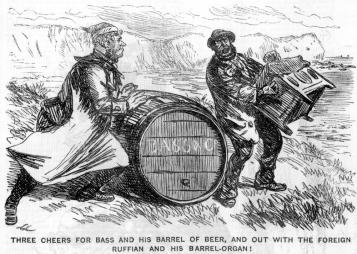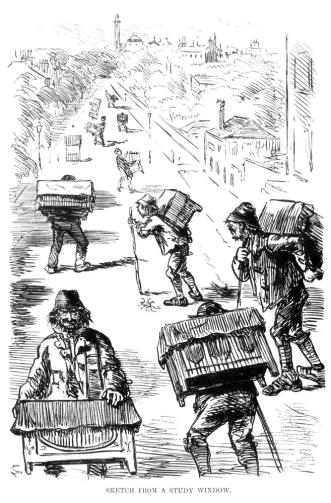Earwigs and a Leech: organ grinders in Victorian cities
A recent discussion about people in streets over on iMomus’s Click Opera had me thinking (admittedly retrogressively, and off on a tangent) about some of my earlier backwards advances in the field of Victorian sound studies. So today I revisit the strange and sad case of John Leech, the artist who provided cartoons for Punch, and illustrations for his friend Dickens’s A Christmas Carol; and who allegedly suffered death by organ-grinding.
(For the record, there’s also an organ grinding reference, more cacophonous than subtle, on The Spirit Salon, but that’s for another time.)
Here’s a cartoon by Leech, from 1864:

Basically this is a bad visual pun, showing the beer barrel of Michael T. Bass, the brewery owner and MP for Derby, giving a foreign street musician and his barrel organ what for. The occasion for this cartoon was the Act of Parliament introduced by Bass that would give citizens the right to drive itinerant musicians away from the vicinity of their homes. Technically, the law applied to all musicians, but as far as the caricaturists were concerned, the organ-grinder was the chief menace; this figure was usually referred to as a “Savoyard”, although street musicians might have arrived in London from all parts of Switzerland, Italy and France.
Of course, the organ grinder with his monkey companion and his repertoire of popular tunes, can hardly have been repsonsible for all the noise of a growing, recently-industrialised Victorian city. It’s worth noting that the word “nuisance” became popularised in this era, used particularly to denote distractions through noise. So why is the organ-grinder singled out as a cause of a more general hubbub?
The Leech cartoon shown above exhibits the undisguised xenophobia typical of political satire of the time. What seems to have particularly bothered Leech about the organ grinder is that he makes foreign noises, noises that are invasive or intrusive. Leech labels him a “ruffian”, making an implicit distinction between continental barbarism (noise) and British sophistication (music, art).
That’s why it wasn’t only MPs like Bass who joined the crusade against foreign street musicians. There were a fair few representatives from the Victorian cultural elite — among them a novelist (Dickens), a philosopher-mathematcian (Babbage), and a historian (Carlyle). The efforts of these people in the campaign can be explained in part as being in opposition to the street-performers as purveyors of low-brow entertainment.
Here’s how Thomas Carlyle reacted to an organ-grinder who patrolled the streets outside his home:
The question arises, Whether to go out and, if not assassinate him, call the Police upon him, or to take myself away to the bath-tub and the other side of the house? Of course, I ought to chuse the latter alternative, – and do, for the wretch’s organ is a horse one, I hear; drawn by a horse; and, one w[oul]d think, played by one!
Another loudening and deafening urban noise, above the flat line of sound introduced by industrialisation, came from street criers. The itinerant tradesmen or low-brow entertainer, whose workspace is the street itself, is in opposition to the domesticated intellectual whose workplace is his home.
Carlyle famously had a sound-proof study constructed for himself at his home at 5 Cheyne Row, but still his domestic space was assaulted on all sides by “noises, even accidental onces, which get free access through my open windows”. The home, then, becomes a contested territory, or a site of sonic conflict. Virginia Woolf realised exactly this about Carlyle’s house, a visit to which she recorded in her essay “Great Men’s Houses”: she alludes to “the rattle of a barrel organ, and the raucous shouts of street hawkers” that come “through walls whose double thickness distorted but by no means excluded the sound”, before concluding that 5 Cheyne Row is “not so much a dwelling-place as a battlefield”.
So much for street noise invading the domestic realm (which is also, problematically, study space). In the case of John Leech, though, nuisance noise intruded into the psyche of the annoyed.
Leech was already an invalid, suffering from a heart condition and nervous temperament. He seems to have been unfortunate enough to possess an extreme sensitivity to noise, explaining to the Pre-Raphaelite painter William Holman Hunt that his demise was caused by “the incessant vexation of organ grinding, and the need of doing my work while the wretched instruments of torture were, from different points, turning out their discordant notes into my brain.” To his friend and biographer William Powell Frith he wrote, in 1864: “Rather, Frith, than continue to be tormented in this way, I would prefer to go to the grave where there is no noise”. Two months later he died.
The psychological deterioration of Leech is illustrated by comparing his previous, satirical cartoon against the barrel-organist, and this later picture entitled “Sketch from a Study Window”:

This is Leech’s window onto the world — the silly comedy of the earlier cartoon has been replaced by out-and-out grotesquerie. The weirdly exaggerated scene shows an otherwise quiet road literally crawling with organ grinders, as if the street were the scene of some ghastly infestation. A single insect is also included in the middle of the street, as if to signal the insect (earwig?) nature of the musicians.
Clearly this is a peculiar projection of Leech’s damaged psyche, but it’s true that, post-R. Murray Schafer, post-noise abatement and acoustic ecology, we still make similar judgments about unwanted noise. Certain sounds are considered “noise pollution”, but what determines whether a sound is “wanted” or not?
favorited this one, brother
When I initially left a comment I seem to have clicked on the -Notify me when new comments are added- checkbox and from now on every time a comment is added I get 4 emails with the exact same comment. Is there a means you are able to remove me from that service? Thanks a lot!